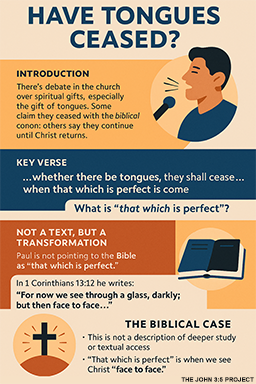Article
Search Articles
Listen
Download Article Study Sheet
Get the study sheet to review the highlights of this article.
Download Study SheetRelated Articles
Get The Infographic
Get the full sized infopgraphic overview highlighting the key points discussed in this article.
Download Now
Have Tongues Ceased? A Clear Look at “That Which Is Perfect”
 Loading author...
Loading author...

There's an ongoing debate in the modern church over spiritual gifts—especially the gift of tongues.
Some claim that the miraculous gifts of the Spirit ceased with the close of the biblical canon.
Others hold to their continuation until the return of Christ. But what does the Bible actually say?
One key verse stands at the center of this argument:
“...whether there be tongues, they shall cease… when that which is perfect is come”
(1 Corinthians 13:8–10)
The question then becomes: What is “that which is perfect”?
Not a Text, but a Transformation
Let's get to the heart of the matter. Paul is not pointing to the Bible as “that which is perfect.”
That idea, although popular in some circles, doesn't hold water when you examine the text critically.
Why?
Because in 1 Corinthians 13:12, Paul writes:
“For now we see through a glass, darkly; but then face to face...”
This is not language about clearer study or textual access.
It's relational and firsthand;
the language of experience.
Seeing "face to face" is about knowing and being known,
not about flipping pages.
This is not language about clearer study or textual access. It's relational and firsthand; the language of experience. Seeing "face to face" is about knowing and being known, not about flipping pages.
The Nature of the "Perfect"
The Greek word used here is teleion—it means “complete,” “mature,” or “fully accomplished.” In its biblical usage, it often refers to finality in purpose or maturity in eternal fulfillment. It doesn't point to written documents. It points to the end goal—the culmination of God's plan.
In Philippians 3:12, Paul uses the same word to say: “Not as though I had already attained, either were already perfect…” Clearly, even late into his ministry, Paul did not see himself—or the church—as having arrived at this “perfection.” So when will it arrive?
Face to Face: A Biblical Pattern
Throughout Scripture, “face to face” interaction with God is associated with profound intimacy and divine glory—not scholarly knowledge.
- Exodus 33:11: “The Lord spoke to Moses face to face...”
- Numbers 12:8: “With him I speak mouth to mouth… not in dark speeches…”
- Revelation 22:4: “They shall see His face…”
In each case, “face to face” implies unmediated communion with God. Right now, we experience God through the Spirit, through the Word, and through the Church. But not yet face to face. Not yet fully. That day awaits the return of Christ and the glorification of His people.
The Gifts Remain Until Then
Here's where the logic follows'
- Spiritual gifts were given for edification, not entertainment.
- The church is still here, and it still needs edification.
- Therefore, the gifts are still needed—and still available.
Here's where the logic follows' Paul makes this even more concrete just one chapter later:
Here's where the logic follows'
“Follow after charity, and desire spiritual gifts, but rather that ye may prophesy.” (1 Cor. 14:1)If tongues had already ceased or were about to fade away in the first century, Paul wouldn't urge believers to pursue them. That would be like telling someone to buy a horse when cars are about to be invented—it just doesn't make sense.
What About the Argument from Church History?
Cessationists often point out that the early church fathers didn't write extensively about tongues. But absence of mention is not proof of absence. In fact, writings from Irenaeus, Tertullian, and others do mention gifts still at work in various churches. And throughout history whether in revivals, missionary outpourings, or persecuted churches—tongues and prophecy have continued to appear.
A World Still Broken
Let's be honest:
we still live in a broken world. The church is not yet perfect. We don't
know all things. We don't see clearly. Sin remains. Death still stings. Satan still roars.
We are not there yet.
So if “that which is perfect” refers to the return of Christ and the full manifestation of the kingdom
of God (which Scripture overwhelmingly supports), then we must conclude:
Tongues have not ceased. Nor has prophecy. Nor knowledge.
The gifts remain—not because the church is charismatic, but because the church is still waiting.
Waiting for the day when we won't need prophecy, because we'll hear Him directly. When we won't need tongues,
because we'll speak with the King. When we won't need knowledge, because we'll know, fully and finally, even
as we are known.
To silence the gifts prematurely is to declare that the church is already complete, something Paul, Peter,
and John never did; and more importantly, something God never said.
Until we see Him face to face, the gifts remain.